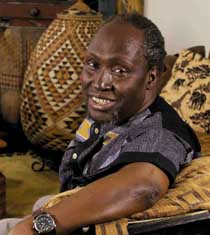Acclaimed writer and Critic Ngũgĩ wa Thiong’o to Speak at CSUN

Ngũgĩ wa Thiong’o
Internationally acclaimed Kenyan writer and critic Ngũgĩ wa Thiong’o will discuss his work and the power of language to inspire and motivate people, during a special presentation on Friday, Nov. 7, at California State University, Northridge.
Ngũgĩ, a distinguished professor of English and comparative literature at the University of California, Irvine and a finalist for the 2014 Nobel Prize in literature, is scheduled to make his presentation from 2 to 3:30 p.m. in the Music Recital Hall in Cypress Hall, located near the southwest corner of the campus near Nordhoff Street and Etiwanda Avenue. His appearance is part of the university’s celebration of the 45th anniversaries of the Africana and Chicana/o studies departments.
“Ngũgĩ’s literary activities span more than 50 years, starting in the 1960s when his work was dedicated to colonialism and some of its deleterious effects on the local population,” said Africana studies professor Tom Spencer-Walters, who organized Ngũgĩ’s visit along with Chicana/o studies professor Renee Moreno. “He wanted his readers to understand the difficult transitions whole African populations had to go through to reclaim their independence and identity from colonial control.
“True to his craft, Ngũgĩ did not spare the lost opportunities for cultural and political redefinition and regeneration, or the missteps and indiscretions of African post-colonial governments,” Spencer-Walters continued. “Ngũgĩ understands that memory of the past is crucial to reclamation of one’s identity and culture. He believes that the most effective way to communicate the shared ancestry of a people is through their indigenous languages. Indigenous languages are definitely repositories of the community’s memory.”
Moreno said she hopes attendees realize that “memory, the grand definition of that term, is crucial to the development of culture and language.”
Born in Kenya, Ngũgĩ wrote his first play, “The Black Hermit,” while still an English student at Makerere University in Kampala, Uganda. He graduated in 1963 and published his first novel, “Weep Not, Child,” a year later while attending the University of Leeds in England. It was the first novel in English to be published by a writer from East Africa. His second novel, “The River Between,” which has its backdrop in the Mau Mau Rebellion, is required reading in Kenya’s national secondary school syllabus.
In 1967, Ngũgĩ published “A Grain of Wheat” and took a position as a lecturer in English literature at the University of Nairobi. Nearly 10 years later, in 1976, he helped establish the Kamiriithu Community Education and Cultural Centre, which among other things organized African theater in the area. Ngũgĩ wrote many of its productions.
His 1977 play “Ngaahika Ndeenda (I Will Marry When I Want)” was sharply critical of the inequalities and injustices in Kenyan society and drew the ire of the government. He was arrested and imprisoned without charge at Kamiti Maximum Security Prison. While in prison, Ngũgĩ made the decision to give up writing in English and write in his native Gikuyu. He wrote “Caitaani mũtharaba-Inĩ (Devil on the Cross)” on prison-issued toilet paper. It was the first modern novel written in Gikuyu.
After Amnesty International named him a “prisoner of conscience,” an international campaign was launched, securing his release in 1978. Ngũgĩ was forced into exile. He wasn’t able to safely return to Kenya for 22 years.
His later works include his prison diary, “Detained,” “Decolonizing the Mind: The Politics of Language in African Literature” and “Matigari,” one of his most popular works, a satire based on a Gikuyu folktale.
In 1992, Ngũgĩ became a professor of comparative literature and performance studies at New York University, where he held the Erich Maria Remarque Chair. He is currently teaching at UC Irvine, where he is also director of the university’s International Center for Writing and Translation.
His most recent books include “Something Torn and New: An African Renaissance,” a collection of essays published in 2009, and two autobiographical works, “Dreams in a Time of War: A Childhood Memoir” and “In the House of the Interpreter: A Memoir.”
Ngũgĩ is the recipient of several honors, including the 2001 Nonino International Prize for Literature and seven honorary doctorates.
For more information about Ngũgĩ’s presentation, call Tom Spencer-Waltres are (818) 677- 7819 or Renee Moreno at (818) 677-7110.

 experience
experience